必修三unit4语法课
- 格式:ppt
- 大小:729.00 KB
- 文档页数:1
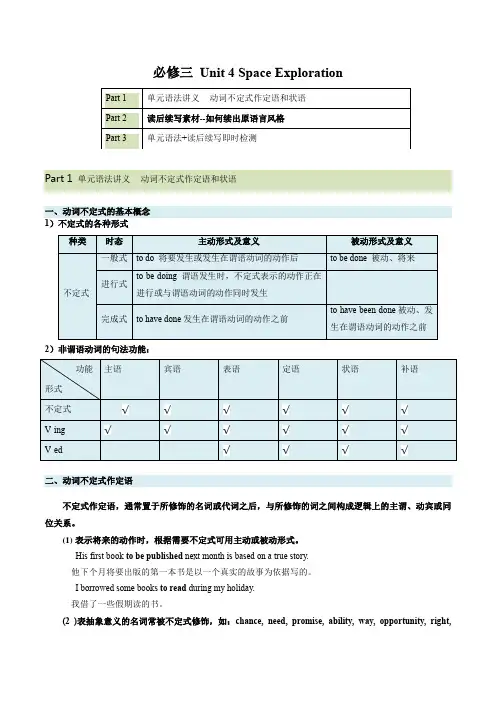
必修三Unit 4 Space ExplorationPart 1 单元语法讲义--动词不定式作定语和状语一、动词不定式的基本概念1)不定式的各种形式2)非谓语动词的句法功能:二、动词不定式作定语不定式作定语,通常置于所修饰的名词或代词之后,与所修饰的词之间构成逻辑上的主谓、动宾或同位关系。
(1)表示将来的动作时,根据需要不定式可用主动或被动形式。
His first book to be published next month is based on a true story.他下个月将要出版的第一本书是以一个真实的故事为依据写的。
I borrowed some books to read during my holiday.我借了一些假期读的书。
(2 )表抽象意义的名词常被不定式修饰,如:chance, need, promise, ability, way, opportunity, right,attempt, plan, evidence等,常表同位关系。
Do you have the ability to read and write in English?你有用英语读和写的能力吗?(3)名词或代词由序数词或最高级修饰,再被非谓语修饰时,一般用不定式作定语,表主谓关系。
She is always the first student to come and the last to leave.(主谓关系)她总是第一个来最后一个走的学生。
(4)在表示有要做的事情时,通常用不定式作定语,不定式与被修饰词之间为被动关系。
—Do you have anything to be typed, sir?—No, thanks.——先生,你有东西要打印吗?——没有,谢谢。
I have a lot of work to do.我有许多活要干。
名师点津:若不定式中的动词是不及物动词,则要在该动词后加适当的介词。
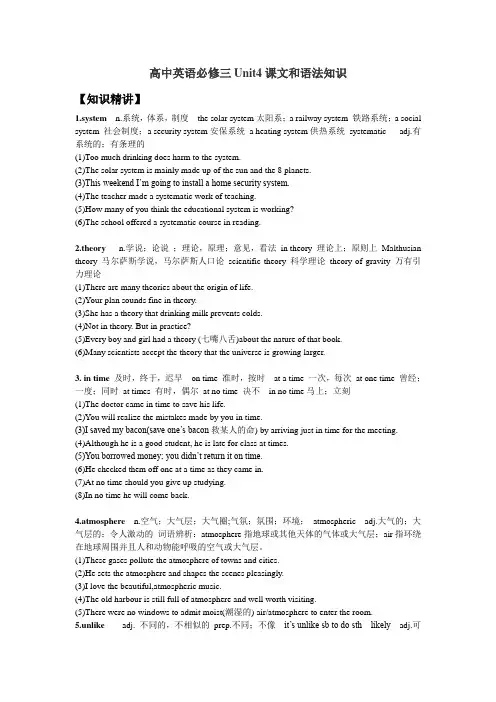
高中英语必修三Unit4课文和语法知识【知识精讲】1.system n.系统,体系,制度the solar system太阳系;a railway system 铁路系统;a social system 社会制度;a security system安保系统a heating system供热系统systematic adj.有系统的;有条理的(1)Too much drinking does harm to the system.(2)The solar system is mainly made up of the sun and the 8 planets.(3)This weekend I’m going to install a home security system.(4)The teacher made a systematic work of teaching.(5)How many of you think the educational system is working?(6)The school offered a systematic course in reading.2.theory n.学说;论说;理论,原理;意见,看法in theory 理论上;原则上Malthusian theory 马尔萨斯学说,马尔萨斯人口论scientific theory 科学理论theory of gravity 万有引力理论(1)There are many theories about the origin of life.(2)Your plan sounds fine in theory.(3)She has a theory that drinking milk prevents colds.(4)Not in theory. But in practice?(5)Every boy and girl had a theory (七嘴八舌)about the nature of that book.(6)Many scientists accept the theory that the universe is growing larger.3. in time及时,终于,迟早on time 准时,按时at a time 一次,每次at one time 曾经;一度;同时at times 有时,偶尔at no time 决不in no time马上;立刻(1)The doctor came in time to save his life.(2)You will realize the mistakes made by you in time.(3)I saved my bacon(save one’s bacon救某人的命) by arriving just in time for the meeting.(4)Although he is a good student, he is late for class at times.(5)You borrowed money; you didn’t return it on time.(6)He checked them off one at a time as they came in.(7)At no time should you give up studying.(8)In no time he will come back.4.atmosphere n.空气;大气层;大气圈;气氛;氛围;环境;atmospheric adj.大气的;大气层的;令人激动的词语辨析:atmosphere指地球或其他天体的气体或大气层;air指环绕在地球周围并且人和动物能呼吸的空气或大气层。
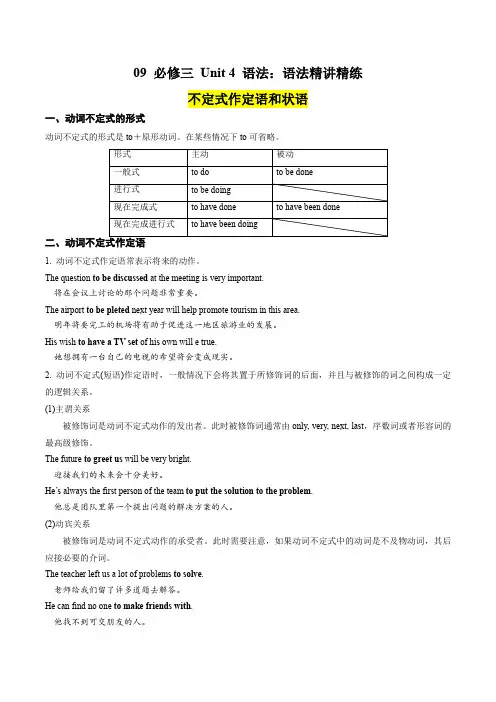
09 必修三Unit 4 语法:语法精讲精练不定式作定语和状语一、动词不定式的形式动词不定式的形式是to+原形动词。
在某些情况下to可省略。
1. 动词不定式作定语常表示将来的动作。
The question to be discussed at the meeting is very important.将在会议上讨论的那个问题非常重要。
The airport to be pleted next year will help promote tourism in this area.明年将要完工的机场将有助于促进这一地区旅游业的发展。
His wish to have a TV set of his own will e true.她想拥有一台自己的电视的希望将会变成现实。
2. 动词不定式(短语)作定语时,一般情况下会将其置于所修饰词的后面,并且与被修饰的词之间构成一定的逻辑关系。
(1)主谓关系被修饰词是动词不定式动作的发出者。
此时被修饰词通常由only, very, next, last,序数词或者形容词的最高级修饰。
The future to greet us will be very bright.迎接我们的未来会十分美好。
He’s always the first person of the team to put the solution to the problem.他总是团队里第一个提出问题的解决方案的人。
(2)动宾关系被修饰词是动词不定式动作的承受者。
此时需要注意,如果动词不定式中的动词是不及物动词,其后应接必要的介词。
The teacher left us a lot of problems to solve.老师给我们留了许多道题去解答。
He can find no one to make friends with.他找不到可交朋友的人。
Mr Brown has something important to deal with at present.目前布朗先生有重要的事情要处理。
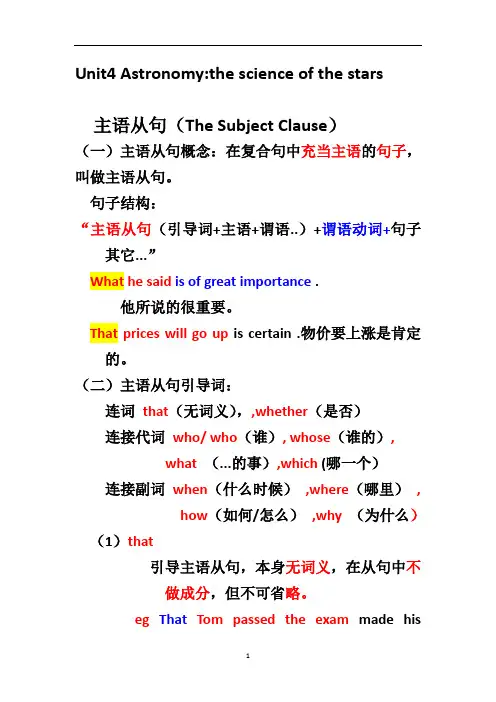
Unit4 Astronomy:the science of the stars主语从句(The Subject Clause)(一)主语从句概念:在复合句中充当主语的句子,叫做主语从句。
句子结构:“主语从句(引导词+主语+谓语..)+谓语动词+句子其它...”What he said is of great importance .他所说的很重要。
That prices will go up is certain .物价要上涨是肯定的。
(二)主语从句引导词:连词that(无词义),,whether(是否)连接代词who/ who(谁), whose(谁的),what(...的事),which (哪一个)连接副词when(什么时候),where(哪里),how(如何/怎么),why (为什么)(1)that引导主语从句,本身无词义,在从句中不做成分,但不可省略。
eg That Tom passed the exam made hisparents happy .汤姆通过(2)whether引导主语从句,意为“是否”,在从句中不做成分,不可省略,位于句首时不能用if 。
Whether we ‘ll go camping tomorrow dependson the weather.明天我们是否去野营取决于天气。
(3)what引导主语从句,意为“...的事,”在从句中做主语、宾语、表语,不可省略。
What is needed for the space trip is careful preparation .(what 在从句作主语)去太空旅行所需要的就是仔细的准备。
What they want is a good book.(what 在从句作宾语)他们想要的就是一本好书。
(4)其它特殊疑问词引导的主语从句:注意特殊疑问词引导的主语从句要用陈述语序。
Who will do it doesn’t matter.谁要做这件事没关系。
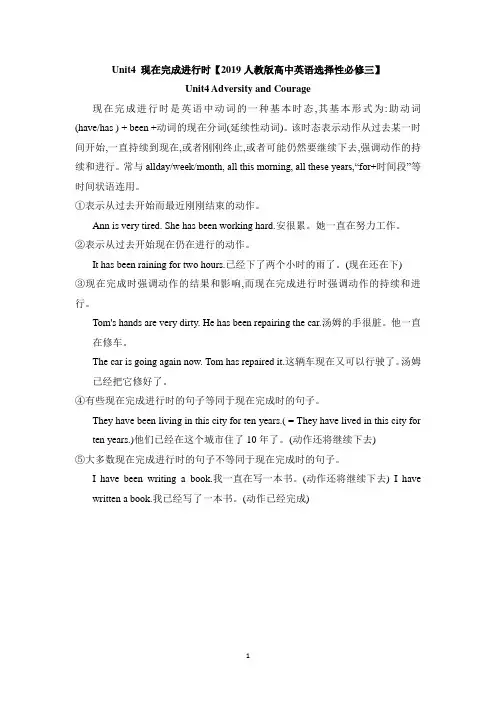
Unit4 现在完成进行时【2019人教版高中英语选择性必修三】Unit4 Adversity and Courage现在完成进行时是英语中动词的一种基本时态,其基本形式为:助动词(have/has ) + been +动词的现在分词(延续性动词)。
该时态表示动作从过去某一时间开始,一直持续到现在,或者刚刚终止,或者可能仍然要继续下去,强调动作的持续和进行。
常与allday/week/month, all this morning, all these years,“for+时间段”等时间状语连用。
①表示从过去开始而最近刚刚结束的动作。
Ann is very tired. She has been working hard.安很累。
她一直在努力工作。
②表示从过去开始现在仍在进行的动作。
It has been raining for two hours.已经下了两个小时的雨了。
(现在还在下)③现在完成时强调动作的结果和影响,而现在完成进行时强调动作的持续和进行。
Tom's hands are very dirty. He has been repairing the car.汤姆的手很脏。
他一直在修车。
The car is going again now. Tom has repaired it.这辆车现在又可以行驶了。
汤姆已经把它修好了。
④有些现在完成进行时的句子等同于现在完成时的句子。
They have been living in this city for ten years.( = They have lived in this city for ten years.)他们已经在这个城市住了10年了。
(动作还将继续下去)⑤大多数现在完成进行时的句子不等同于现在完成时的句子。
I have been writing a book.我一直在写一本书。
(动作还将继续下去) I havewritten a book.我已经写了一本书。
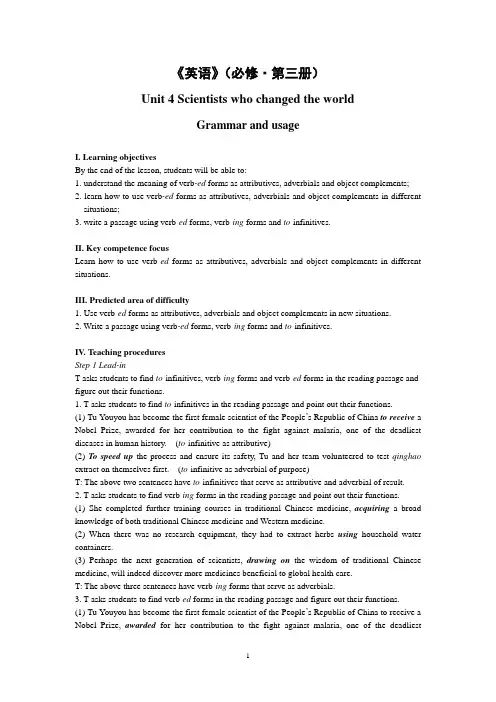
《英语》(必修·第三册)Unit 4 Scientists who changed the worldGrammar and usageI. Learning objectivesBy the end of the lesson, students will be able to:1. understand the meaning of verb-ed forms as attributives, adverbials and object complements;2. learn how to use verb-ed forms as attributives, adverbials and object complements in different situations;3. write a passage using verb-ed forms, verb-ing forms and to-infinitives.II. Key competence focusLearn how to use verb-ed forms as attributives, adverbials and object complements in different situations.III. Predicted area of difficulty1. Use verb-ed forms as attributives, adverbials and object complements in new situations.2. Write a passage using verb-ed forms, verb-ing forms and to-infinitives.IV. Teaching proceduresStep 1 Lead-inT asks students to find to-infinitives, verb-ing forms and verb-ed forms in the reading passage and figure out their functions.1. T asks students to find to-infinitives in the reading passage and point out their functions.(1) Tu Youyou has become the first female scientist of the People’s Republic of China to receive a Nobel Prize, awarded for her contribution to the fight against malaria, one of the deadliest diseases in human history. (to-infinitive as attributive)(2) To speed up the process and ensure its safety, Tu and her team volunteered to test qinghao extract on themselves first. (to-infinitive as adverbial of purpose)T: The above two sentences have to-infinitives that serve as attributive and adverbial of result. 2. T asks students to find verb-ing forms in the reading passage and point out their functions. (1) She completed further training courses in traditional Chinese medicine,acquiring a broad knowledge of both traditional Chinese medicine and Western medicine.(2) When there was no research equipment, they had to extract herbs using household water containers.(3) Perhaps the next generation of scientists, drawing on the wisdom of traditional Chinese medicine, will indeed discover more medicines beneficial to global health care.T: The above three sentences have verb-ing forms that serve as adverbials.3. T asks students to find verb-ed forms in the reading passage and figure out their functions. (1) Tu Youyou has become the first female scientist of the People’s Republic of China to receive a Nobel Prize, awarded for her contribution to the fight against malaria, one of the deadliestdiseases in human history. (verb-ed form as attributive)(2) Thanks to her discovery of qinghaosu, malaria patients all over the world now have had a greatly increased chance of survival. (verb-ed form as attributive)(3) Even with large amounts of qinghao extract produced, however, they still faced another problem. (verb-ed form as attributive)(4) Born in 1930, in Ningbo, Zhejiang Province, Tu studied medicine at university in Beijing between 1951 and 1955. (verb-ed form as adverbial)(5) Inspired by an over 1,600-year-old text about preparing qinghao extract with cold water, Tu redesigned the experiments. (verb-ed form as adverbial)T: The above five sentences have verb-ed forms that serve as attributives and adverbials.【设计意图:学生在前面两个单元的语法部分已经学习了动词不定式和动词-ing形式的用法,对本单元的阅读文章内容也已经熟悉,所以先在学生相对熟悉的语境中呈现含有动词不定式和动词-ing形式的句子,然后再呈现新的语法知识—动词-ed形式作定语和状语。
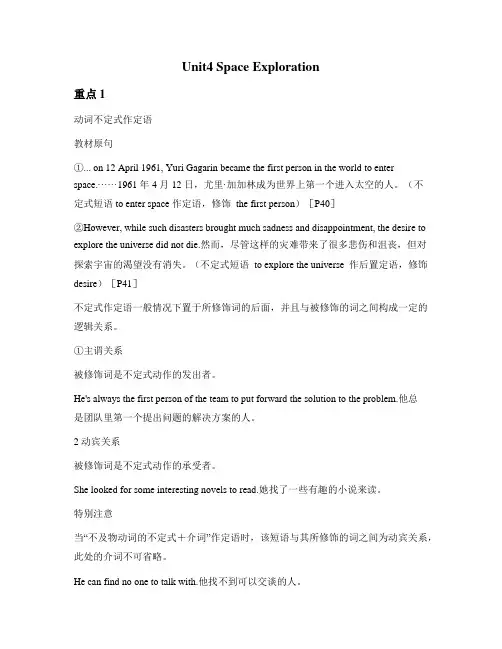
Unit4 Space Exploration重点1动词不定式作定语教材原句①... on 12 April 1961, Yuri Gagarin became the first person in the world to enter space.······1961年4月12日,尤里·加加林成为世界上第一个进入太空的人。
(不定式短语to enter space作定语,修饰the first person)[P40]②However, while such disasters brought much sadness and disappointment, the desire to explore the universe did not die.然而,尽管这样的灾难带来了很多悲伤和沮丧,但对探索宇宙的渴望没有消失。
(不定式短语to explore the universe 作后置定语,修饰desire)[P41]不定式作定语一般情况下置于所修饰词的后面,并且与被修饰的词之间构成一定的逻辑关系。
①主谓关系被修饰词是不定式动作的发出者。
He's always the first person of the team to put forward the solution to the problem.他总是团队里第一个提出问题的解决方案的人。
2动宾关系被修饰词是不定式动作的承受者。
She looked for some interesting novels to read.她找了一些有趣的小说来读。
特别注意当“不及物动词的不定式+介词”作定语时,该短语与其所修饰的词之间为动宾关系,此处的介词不可省略。
He can find no one to talk with.他找不到可以交谈的人。
③部分抽象名词后常接不定式作后置定语。
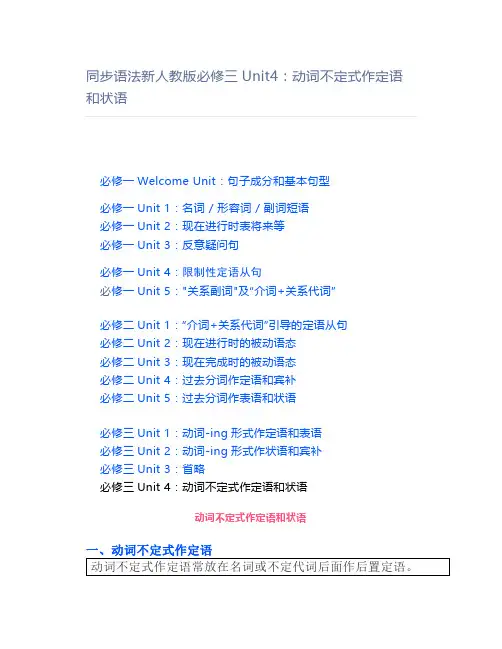
同步语法新人教版必修三Unit4:动词不定式作定语和状语必修一Welcome Unit:句子成分和基本句型必修一Unit 1:名词 / 形容词 / 副词短语必修一Unit 2:现在进行时表将来等必修一Unit 3:反意疑问句必修一Unit 4:限制性定语从句必修一Unit 5:"关系副词"及“介词+关系代词”必修二Unit 1:“介词+关系代词”引导的定语从句必修二Unit 2:现在进行时的被动语态必修二Unit 3:现在完成时的被动语态必修二Unit 4:过去分词作定语和宾补必修二Unit 5:过去分词作表语和状语必修三Unit 1:动词-ing形式作定语和表语必修三Unit 2:动词-ing形式作状语和宾补必修三Unit 3:省略必修三Unit 4:动词不定式作定语和状语动词不定式作定语和状语【巩固练习】用所给单词的适当形式填空1.The airport ________ (complete) next year will help promote tourism in this area.2.The best way __________ (improve) your English is to join an English club.3.Some scientists were determined to help humans realise their dream________(explore)space.4.—The last one________( arrive )pays themeal. —Agreed!5.On 12 April 1961, Yuri Gagarin became the first person in the world ________(go) into space.6.With the world changing fast, we have something new________(deal )with all by ourselves every day.7.A group of young people got together ________( discuss) this question.8.First of all, you must be intelligent enough________( get) a related college degree.9.He got up late and hurried to his office,________(leave)the breakfast untouched.10.Anxiously, she took the dress out of the package and tried it on, only______ ( find)it didn’t fit.11.When the gorillas and I frightened each other, I was just glad ______(find) them alive.12.The question was very difficult ________(answer).13.The box is light enough ________( carry).14._________(work out) the difficult maths problem, I have consulted Professor Russell several times. 15.________(learn) more about Chinese culture, Jack has decided to take Chinese folk music as an elective course.【参考答案】1. to be completed2. to improve3. to explore4. toarrive5. to go6. to deal7. to discuss8. to get 9 . leaving 10. to find 11. to find 12. to answer 13. to carry 14. To work out 15. To learn。
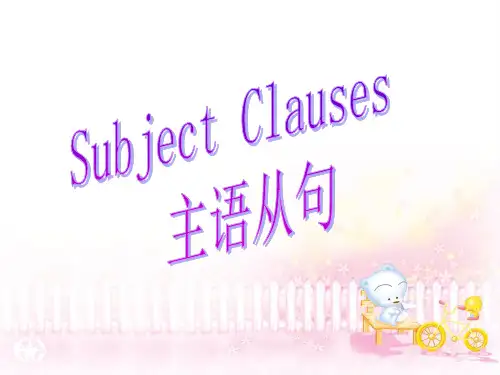
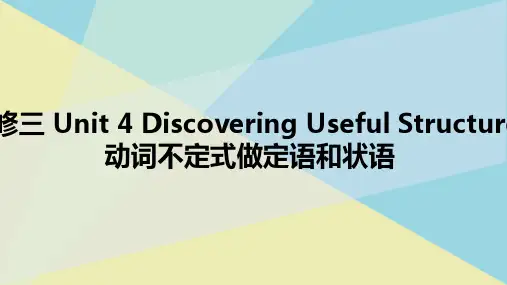
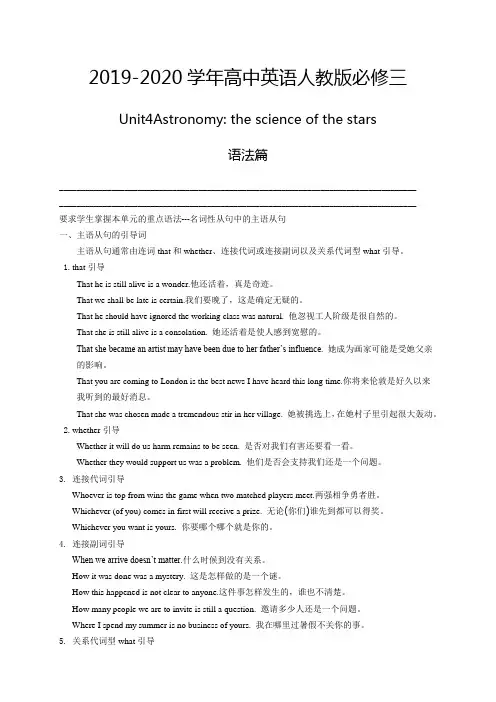
2019-2020学年高中英语人教版必修三Unit4Astronomy: the science of the stars语法篇____________________________________________________________________________________________________________________________________________________________________要求学生掌握本单元的重点语法---名词性从句中的主语从句一、主语从句的引导词主语从句通常由连词that和whether、连接代词或连接副词以及关系代词型what引导。
1.that引导That he is still alive is a wonder.他还活着,真是奇迹。
That we shall be late is certain.我们要晚了,这是确定无疑的。
That he should have ignored the working class was natural. 他忽视工人阶级是很自然的。
That she is still alive is a consolation. 她还活着是使人感到宽慰的。
That she became an artist may have been due to her father’s influence. 她成为画家可能是受她父亲的影响。
That you are coming to London is the best news I have heard this long time.你将来伦敦是好久以来我听到的最好消息。
That she was chosen made a tremendous stir in her village. 她被挑选上,在她村子里引起很大轰动。
2.whether引导Whether it will do us harm remains to be seen. 是否对我们有害还要看一看。